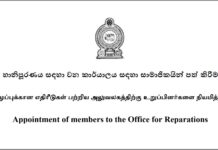The iconic Colombo Tea Auction, in its formal configuration, and the Colombo Tea Traders Association, the Apex Body of the country’s tea industry, from their respective inceptions, have been virtually synonymous. They both came into existence around the same time, towards the end of the nineteenth century, and have ever since developed in close association with each other.
The commercial cultivation of tea has been acknowledged to have commenced in 1867, followed shortly thereafter by the devastating coffee blight. This fortuitously enabled tea to replace coffee, which, till then, was the main cash crop of the Island. On July 30, 1883, the first tea auction, private in nature, took place in the offices of Somerville & Company, a firm of Produce Brokers. It comprised a mere five invoices of tea, of which almost all remained unsold on the occasion, in the absence of adequate bids.
By the 1890s, the Tea Industry had acquired a position of significance in the commercial sector and production volumes had grown to an extent that necessitated formal regulation in disposal. The Producers requested the Ceylon Chamber of Commerce, established in 1839, which was mainly a commodity orientated organization then, to assist in this initiative. On June 18, 1894, an Association, under the title, “The Colombo Tea Traders’ Association”, materialized, with the primary objective of safeguarding the interests of the Tea Trade. Its first General Meeting was held on August 9, 1894.
One of the first undertakings of this Association was to review the loose collection of rules under which the auction of tea was being conducted, hitherto, so as to ensure the orderly and efficient operation of the auction. On November 1, 1894, recommendations on the “Rules of the Conditions of Sale”, were ratified. Thus, the By-Laws and Conditions for the Sale of Tea by Public Auction came into formal existence.
With the progressive increase in production volumes and the development of the Tea Industry, these have been reviewed and updated under the guidance of the Colombo Tea Traders’ Association to provide a stable, reliable and credible procedure for the sale of Tea, to meet the requirements of the changing circumstances of the Trade. An unique feature is that producers are unfailingly paid for their product by the 7th day following the auction at which it is sold.
It developed a reputation as a model auction centre for its efficiency and professionalism and was supported by a sound infrastructure, which evolved over a period in excess of 125 years. Operating as an ‘out-cry’ auction, it was conducted in three auction rooms, two of which were custom-built auditoria, especially to accommodate the Colombo Tea Auction. It is the preferred authorized channel for the disposal of the overwhelming volume in excess of 300 million kgs of Ceylon Tea each year. It is acknowledged as the most transparent, orderly and disciplined means of selling Tea. It generates the widest possible competition and, consequently, the optimum prices for the Teas disposed of through its system. Internationally, prices realized at the Colombo Tea Auction are, on average, considerably higher than any other auction centre in the world, mainly on account of its acknowledged superior quality.
It processes an average of 6 to 7 million kgs., spread over approx. 10,000 to 12,500 lots/invoices of tea per week at 50 weekly tea auctions unfailingly conducted each year. To accommodate this volume, the Colombo Tea Auction was generally held consecutively, over two full days each week, concurrently, in three different auction rooms within the Ceylon Chamber of Commerce building. The two custom-built auditoria, with a minimum seating capacity of 175 each, are unique in that they permit the Selling Broker on the rostrum, located in the well of the auditoria, eye contact with all the participants, on account of the specially designed semi-circular, tiered seating arrangement. This was vital to ensure that every bid is registered, in view of the pace at which the auction is conducted and the value of each transaction – on average, four to five lots/invoices were sold each minute, which accounts for transactions of an average value of Rs.1.5 million, or more, being concluded during every minute of the proceedings. A single missed bid could be quite costly to both the Seller/Producer and the Buyer/Exporter. The total sales proceeds at each auction amounts to approximately Rs.2.5 to 3 billion.
With the demise of the London Tea Auction in 1998, the Colombo Tea Auction was recognized as one of the oldest operational and the largest single-origin tea auction in the world.
The Colombo Tea Auction was internationally renowned and constantly attracted visitors from the global Tea Industry, as well as other international business personalities and overseas Trade Delegations. Government Ministers, high-ranking State Officials, members of the Diplomatic Corps, the Academia, media personnel, both foreign and domestic, Undergraduates, other students and many other persons of repute also regularly visited the Chamber to witness the auction in progress. Its sound infrastructure and its prudently regulated conduct, developed over a period in excess of a century and a quarter, established its credibility and integrity, for which it was acclaimed world-wide, and it was recognized as a model by other auction centres.
The official declaration of the arrival of the Corona virus in the country, towards the middle of March 2020, took everyone by surprise and there was a desperate state of unpreparedness. This was followed by the imposition of uninterrupted 24-hour curfew for a protracted period. However, the Tea Industry met this exigency in an exemplary manner and confronted the dilemma of disposing of the teas already in the pipeline and those yet to reach it, to ensure the sustainability of the tea industry, in the face of many impediments. The Colombo Tea Traders’ Association, as always resilient, tangibly converted the axiom, “Necessity is the mother of invention”, into a phenomenon and the wheels of the industry recommenced its forward movement, albeit somewhat haltingly. It ensured that there were no interruptions in the supply chain, notwithstanding numerous challenges.
The legendary Colombo Tea Auction, from its much admired outcry system, with the physical presence of its participants at a single location, within the offices of the Ceylon Chamber of Commerce, in specially designed auditoria, was necessarily, unexpectedly and prematurely, transformed into an e-auction, facilitated by a digital platform, with buyers operating from remote locations.
An IT Software Company, named CICRA, working under the guidance of the Colombo Brokers’ Association, whose member were most familiar with the intricacies of the auction operations, developed this digital platform, within an incredibly brief period of about a week, and the first e-Auction commenced on April 4, 2020. This was indeed an admirable achievement, which ensured that the Tea Industry continued to function without interruption, despite the challenging circumstances.
Unfamiliar with the system, initially, the participants had to agonize through an additional 2 to 3 days to reach the conclusion of an auction of an otherwise two-day duration. Having been compiled hurriedly, the system was not flawless, and it was an exercise of trial and error. Understandably, from an auction with an international reputation of efficiency, orderliness and professionalism, as well as charm, the stakeholders had to, not very successfully, reinvent the wheel. However, it was a hands-on learning experience and it gave the stakeholders the opportunity of familiarizing themselves with the operation.
Accepting the inevitable, eventually, the Colombo Tea Traders’ Association appointed a Steering-Committee of IT savvy members, with the guidance of STAX, a leading management consultancy firm with experience and expertise in Information Technology, to undertake a complete review of the value chain with the stakeholders, so as to develop a more professional automated programme. Thereafter, a Request for Proposal [RFP] was prepared, identifying technology-based core functional requirements, enabling the CTTA to initiate a process for the selection of a service provider to develop and implement a permanent, long-term e-auction platform. The primary objective of this initiative is to facilitate an efficient, user friendly, expeditious and viable auction engine, to achieve the overall purpose of completing the auction in the most feasible manner, within the shortest possible duration. Bids were received and a team comprising stakeholders, together with the consultants, evaluated these commercial bids towards assessing the financial commitment over the next five years.
On completion of the evaluation process and the demonstration of the Proof of Concept, in the context of the financial commitment, the CTTA and the Colombo Tea Auction have entered a new era of their 127 years of concurrent existence, in a contemporary environment, with the Software Company, OKLO Private Limited.












